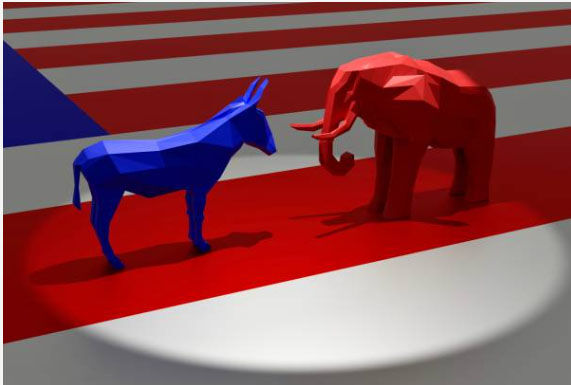Exercising effective leadership is hard to do — but we need it now | CRONIN & LOEVY

Tom Cronin and Bob Loevy
“One of the most universal cravings of our time is a hunger for compelling and creative leadership,” wrote one of our mentors, political scientist James MacGregor Burns.
Yet, nowadays, leaders nearly everywhere are having a rough time.
Syrians have tossed out their brutal dictator and are scrambling to put together provisional leadership. South Koreans have impeached their president who briefly declared martial law. Several incumbent African leaders have been defeated or replaced. Canadians are calling on Prime Minister Justin Trudeau to resign. Germans have passed a vote of no confidence in their leader. The leaders of Japan, France and Great Britain are under fire.
College presidents have been fired or are resigning in record numbers. Corporate chief executives and many big-city mayors are in trouble. An excellent FBI director, appointed by Donald Trump nearly eight years ago, is being ill-advisedly forced to resign.
U.S. voters this year rejected President Joe Biden’s administration. Biden earned about 57% approval in early 2021 and is now leaving the White House with a low 37% rating.
Stay up to speed: Sign up for daily opinion in your inbox Monday-Friday
And even though former President Donald Trump boasts of being one of the greatest presidents of all time, his Gallup approval ratings during his first term averaged a modest 41%. He left the White House with a 34% approval rating.
Why are leaders today having such a hard time? And what does this mean for the U.S. in the next few years?
Effective leadership remains in many ways the most baffling of the performing arts. There is often an element of mystery about it. Intuition, passion, flair and stagecraft come into play, along with strategic reasoning and problem solving.
Stagecraft — or the lack of it — has been front and center in recent times. President Joe Biden, while credited with important accomplishments, lacked stagecraft abilities. His limited communication and inspirational skills, combined with his health challenges, proved a major handicap.
A curious contrast is the currently popular Argentinian President Javier Milei. A Trump admirer, Milei is even more libertarian and anti-government, and even more of a theatrical and operatic showman, than Trump. So far, “Chainsaw” Milei, who is trying to fight inflation, is popular in Argentina. Argentina, however, is known to be rough on its leaders, so time will tell.
Leadership in these polarized times is complicated. The U.S. has witnessed a hardening of party loyalties for both the Democrats and the Republicans. This is occurring even while most U.S. voters tell pollsters they are moderate and increasing numbers are registering to vote as independent or unaffiliated.
There are now sizeable activist voting groups who view political leaders through highly critical political party lenses. In their eyes, only their own political party has the correct philosophy and the right programs.
These activists are quick to blame the opposition party for policies they deem weird or wrongheaded. Obamacare, Trump’s tax cuts, COVID-shutdowns, electric vehicle (EV) mandates — these are all examples of policies which the opposition party blamed on leadership overreach. Today’s instant internet communications trigger nationwide feuds.
Even if the political mood of the country was less polarized than it is today, leadership is hard because of the many paradoxes inherent in leadership.
For example, one paradox is that we want a strong, bold leader, yet we are suspicious of a leader becoming autocratic or violating constitutional norms. After the Watergate scandal in 1972, President Richard Nixon famously commented “If the president does it, it’s not illegal.” Nixon, of course, was forced to resign in 1974. And most Americans were appalled at his claim.
Another paradox of leadership is that we simultaneously want visionary, leadership that brings out the best in us, yet we also want incremental, pragmatic policy changes. In the last election, for example, Democrats were blamed for being too aggressive on “wokeism” and not bold enough on border security and illegal immigration.
President John Quincy Adams had a succinct definition of a leader: “If your actions inspire others to dream more, learn more, do more, and become more, you are a leader.”
Leadership is a collective enterprise. It is an ongoing, subtle and often complicated interplay between widely shared common desires and a leader’s capacity to understand and respond to those desires.
Incoming U.S. President Donald Trump is in an unusual position. He already has experience as president. His political party has narrow control of the Senate, the House of Representatives and the Supreme Court. The Republican Party is more unified now than when he moved into the White House in 2017. And, at least for now, Trump enjoys big business as well as working-class support.
But he does not have an electoral mandate from U.S. voters. Though he won the 2024 election, the election was relatively close. Biden won by a bigger margin in 2020. And more than a third of eligible voters didn’t bother to vote this November.
During his first term, Trump enjoyed strong stock market increases until the COVID pandemic came along. His allies say Trump is inclined to consider how the stock market does as akin to a national poll. Thus, the performance of the stock market might, in some ways, limit Trump’s popularity, providing guardrails in his second term.
Trump likes to compare himself to President Abraham Lincoln, and there are several opportunities for Trump to win more public support.
Americans yearn to see a sensible ending of the wars in Ukraine and Gaza. Trump wants to be a negotiator in these areas, and he could be a successful peacemaker. He should join with our allies and help rebuild a viable Syria — though his much talked about commission to cut government spending and his isolationist views may undercut such efforts.
Americans want more effective border control at the Mexican border, but do not favor the huge mass deportations Trump has proposed. Trump should win approval for a more limited and nuanced solution to border control and the illegal immigration issue.
This will be tricky, because Trump has made virtually impossible claims as to what he will do at the border and do all at once. He must find an acceptable moderate balance on the immigration issue, and this will be a daunting political challenge for him.
Trump will earn applause for sensible efforts to lessen waste in government operations. Nobody favors waste — but few favor government shutdowns.
Some agencies could be consolidated. Some regulations can surely be reduced. And some programs can be postponed or delivered over a longer time span. The soaring national debt is a major problem. Trump faces tough leadership decisions on both tax cuts and government spending reductions.
But Trump will face a huge backlash if he and his super wealthy advisors go after the most popular programs like Social Security, Medicare or military veterans’ entitlements.
Trump is trying to win approval for joining the popular movement to make Daylight Saving Time permanent all year round. Hawaii and Arizona are two states that already have this policy. At least 28 other states have voted for it.
Most presidents have feuded with the media, yet Trump has taken criticism of the media to the next level. But Trump as president needs and basks in media attention. The media needs him. Leadership and intimidation don’t mix well for very long.
Trump and some of his supporters have expressed their desire to get “revenge” on his political opponents. He would be well-advised to control these impulses and concentrate on improving the economy. His models should be Lincoln and Grant — not Lear and Othello.
As a letter writer to the New York Times said recently about Trump: “Imagine a presidency in which the president seeks to uplift the most vulnerable and implement programs that benefit all Americans, not just those who vote for him.” Leaders are lifters.
President-elect Trump is a gifted campaigner, a good storyteller and he is an accomplished showman, as was former President Ronald Reagan.
But even though he is inheriting a strong national economy, Trump has set high expectations for himself. He has made countless promises, and he will be presiding over a country that has become even more skeptical of national leaders and national institutions. He won the presidency in good part because inflation was high, and groceries were expensive. But inflation is not coming down as fast as we would like, and additional high tariffs may well be inflationary.
American voters seem to want what former President Warren Harding promised in 1920 — “A Return to Normalcy.” That is a promise that will be hard to achieve in this time of constant change.
His decisions about the Jan. 6, 2021, insurrection at the U.S. Capitol in Washington, D.C., will continue to be controversial. His TikTok decisions will divide. His deference to Elon Musk could prove problematic.
We yearn for leaders to unite us as well as help us solve problems. Opportunities are always there for a new presidential administration, and the hopes for Trump’s presidency are high in many places. But exercising effective leadership is hard to do.
Tom Cronin and Bob Loevy are news commentators who write on Colorado and national political issues.











